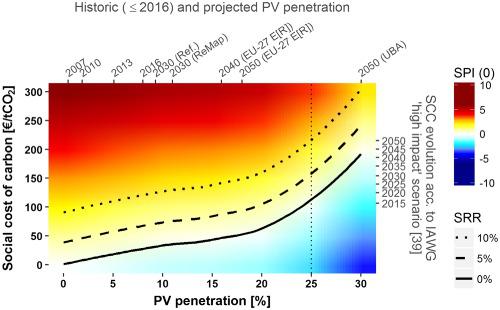当前位置:
X-MOL 学术
›
Prog. Photovoltaics
›
论文详情
Our official English website, www.x-mol.net, welcomes your feedback! (Note: you will need to create a separate account there.)
The social profitability of photovoltaics in Germany
Progress in Photovoltaics ( IF 6.7 ) Pub Date : 2018-02-02 , DOI: 10.1002/pip.2988 Javier López Prol 1, 2 , Karl W Steininger 1, 2
Progress in Photovoltaics ( IF 6.7 ) Pub Date : 2018-02-02 , DOI: 10.1002/pip.2988 Javier López Prol 1, 2 , Karl W Steininger 1, 2
Affiliation

|
While Germany has led the market in photovoltaic (PV) implementation throughout the last decade, there has been increasing criticism of PV support policies due to their high cost. Although declining, the levelized cost of electricity (LCOE) from PV is still above the German wholesale electricity price. However, using LCOE as an evaluation yardstick falls short in at least 2 respects: It neither takes into account integration costs rising with PV penetration (ie, undervaluing its actual cost) nor avoided externalities of replacing conventional for renewable generation (social cost overvaluation). We thus calculate the social profitability of PV in Germany by including not only private costs and benefits but also integration costs to the electricity system and avoided environmental externalities, using the internal rate of return and the profitability index as indicators. Our results show that when these factors are considered, the social profitability of PV in Germany is higher than 10% at the lower bound of the social cost of carbon (150€/tCO2) up to a penetration level of at least 15% and positive up to a penetration level of at least 25%. Results also show the level of private profitability if all externalities were internalized and assert that subsidies are justified to align private and social profitability. The proposed method could be used as a complementary indicator to private profitability by public institutions, development banks, and companies with social responsibility values.
中文翻译:

德国光伏发电的社会盈利能力
尽管德国在过去十年中一直在光伏(PV)实施市场上处于领先地位,但由于光伏支持政策成本高昂,人们对光伏支持政策的批评越来越多。尽管有所下降,但光伏发电的平准化发电成本(LCOE)仍高于德国批发电价。然而,以LCOE作为评价标准至少有两个方面的不足:既没有考虑到随着光伏普及而上升的并网成本(即低估其实际成本),也没有回避可再生能源替代传统发电的外部性(社会成本高估)。因此,我们以内部收益率和盈利指数为指标,不仅包括私人成本和收益,还包括电力系统的整合成本和避免的环境外部性,来计算德国光伏的社会盈利能力。我们的结果表明,考虑到这些因素,在碳社会成本下限(150欧元/tCO 2 )下,德国光伏发电的社会盈利能力高于10%,渗透率至少为15%,并且渗透率至少达到 25%。结果还显示了如果所有外部因素都内部化的情况下的私人盈利水平,并断言补贴有理由使私人和社会盈利能力保持一致。所提出的方法可以被公共机构、开发银行和具有社会责任价值观的公司用作私人盈利能力的补充指标。
更新日期:2018-02-02
中文翻译:

德国光伏发电的社会盈利能力
尽管德国在过去十年中一直在光伏(PV)实施市场上处于领先地位,但由于光伏支持政策成本高昂,人们对光伏支持政策的批评越来越多。尽管有所下降,但光伏发电的平准化发电成本(LCOE)仍高于德国批发电价。然而,以LCOE作为评价标准至少有两个方面的不足:既没有考虑到随着光伏普及而上升的并网成本(即低估其实际成本),也没有回避可再生能源替代传统发电的外部性(社会成本高估)。因此,我们以内部收益率和盈利指数为指标,不仅包括私人成本和收益,还包括电力系统的整合成本和避免的环境外部性,来计算德国光伏的社会盈利能力。我们的结果表明,考虑到这些因素,在碳社会成本下限(150欧元/tCO 2 )下,德国光伏发电的社会盈利能力高于10%,渗透率至少为15%,并且渗透率至少达到 25%。结果还显示了如果所有外部因素都内部化的情况下的私人盈利水平,并断言补贴有理由使私人和社会盈利能力保持一致。所提出的方法可以被公共机构、开发银行和具有社会责任价值观的公司用作私人盈利能力的补充指标。



























 京公网安备 11010802027423号
京公网安备 11010802027423号